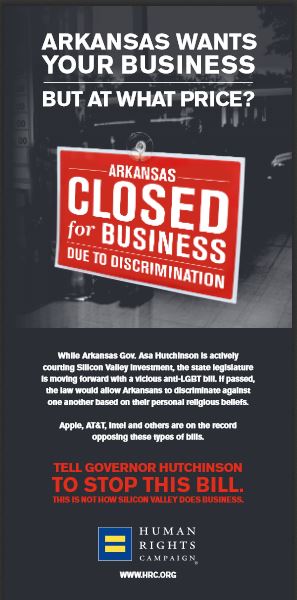
WASHINGTON – As Arkansas Gov. Asa Hutchinson pitches Silicon Valley on investment opportunities in his state, Human Rights Campaign (HRC) President and Arkansas native Chad Griffin announced that the organization will run a full-page ad in the San Jose Mercury News, the largest paper in Silicon Valley and the high-tech industry’s paper of record. The ad will spotlight pending legislation in Arkansas targeting LGBT people and religious minorities. Running on Sunday, the ad notes if Governor Hutchinson allows the bill to become law, he will be ignoring the opposition of employers like Apple, Wal-Mart and other companies who opposed the legislation. A digital version of the ad will also begin running today on various tech websites and will soon start running on the digital properties of the Wall Street Journal.
In Little Rock today, Griffin will deliver a formal invitation to Governor Hutchinson to travel with him to New York City next Tuesday to attend a gathering of more than 250 C-suite executives of Fortune 500 companies and other major businesses—corporations whose investment potential collectively totals in the hundreds of billions of dollars. Each of these companies has scored a 100 percent on the Human Rights Campaign’s Corporate Equality Index (CEI)—demonstrating their core commitment to treating lesbian, gay, bisexual and transgender (LGBT) employees fairly and equally under the law.
“Many of these companies have spoken out publicly in opposition to legislation like H.B. 1228,” Griffin noted in the invitation. “Many of them create the high-tech jobs you argue Arkansas hopes to attract every day. I suspect many of these firms will have questions for you—especially as it relates to H.B. 1228, as well as another piece of anti-LGBT legislation, S.B. 202, which you allowed to become law.”
H.B. 1228 would empower individuals to pick and choose which laws they want to follow and allow an individual to sue government actors, including teachers, firefighters and police officers, if that individual believes their religious rights were being violated by a government action. For instance, a teacher who puts an anti-bullying policy into practice could be at risk of being sued, or a police officer could sue their precinct because patrolling a synagogue violated their religious beliefs. The bill has seen significant opposition from the business community, including statements of disapproval from both Apple and Wal-Mart.
HRC has noted that H.B. 1228 purports to protect religious belief, but actually serve to put jobs and economic activity at risk. So-called “religious freedom restoration acts” could leave small businesses subject to lawsuits and make larger corporations more hesitant to invest in states that are otherwise pro-business. In Indiana, where similar legislation has now become law, companies such as Salesforce.com are choosing to cut their in-state investment because of the response from fair-minded employees and customers alike.
The bill will now head to the full Senate, where anti-LGBT members believe they have enough votes to pass the legislation. Governor Asa Hutchinson has not said whether he would sign the bill should it reach his desk.











